Understanding the Journey
Alcoholism is a progressive disorder, evolving through various stages that impact individuals both physically and psychologically. Recognizing these stages is crucial for early intervention and effective treatment, highlighting the need for increased awareness about the progression of alcohol use disorder.
The Prevalence and Impacts of Alcoholism
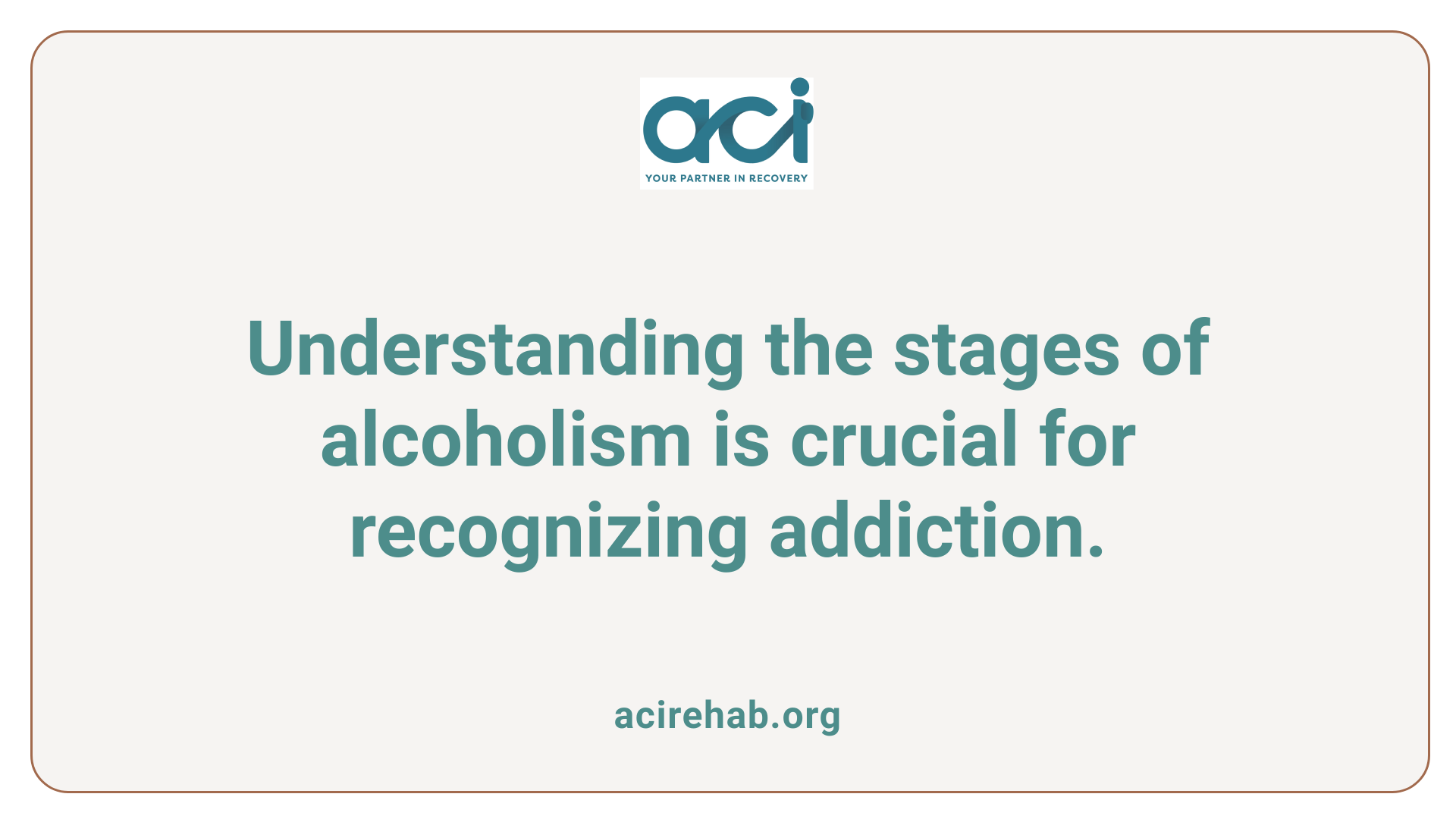
What are the stages of alcoholism?
The stages of alcoholism, as identified by researcher Elvin Morton Jellinek, encompass four distinct phases:
-
Pre-Alcoholic Stage
- Characterized by social drinking and occasional binge drinking.
- Individuals may begin using alcohol to manage stress, with little sign of problem drinking.
-
Early Alcoholic Stage
- Marked by increased consumption and patterns of binge drinking.
- Symptoms include memory blackouts and deceptive drinking behaviors, indicating growing dependence.
-
Chronic Alcoholic Stage
- Obvious signs of addiction surface, such as neglecting responsibilities and lying about drinking.
- Withdrawal symptoms appear when not drinking, further solidifying dependence.
-
End-Stage Alcoholism
- Recognized by severe health problems and a complete loss of control over drinking.
- Complications such as liver disease are common, often requiring immediate medical intervention.
Understanding these stages can aid in recognizing the severity of alcohol use disorders, which affects millions. Indeed, the National Institute on Alcohol Abuse and Alcoholism notes that approximately 17 million American adults struggle with an alcohol use disorder (AUD) each year.
These figures highlight the pressing need for awareness and treatment, as early intervention can significantly alter recovery outcomes. Recognizing the transition through each stage is vital, not only for those affected but also for families and health professionals aiming to provide support.
Progression of Alcohol Use Disorder
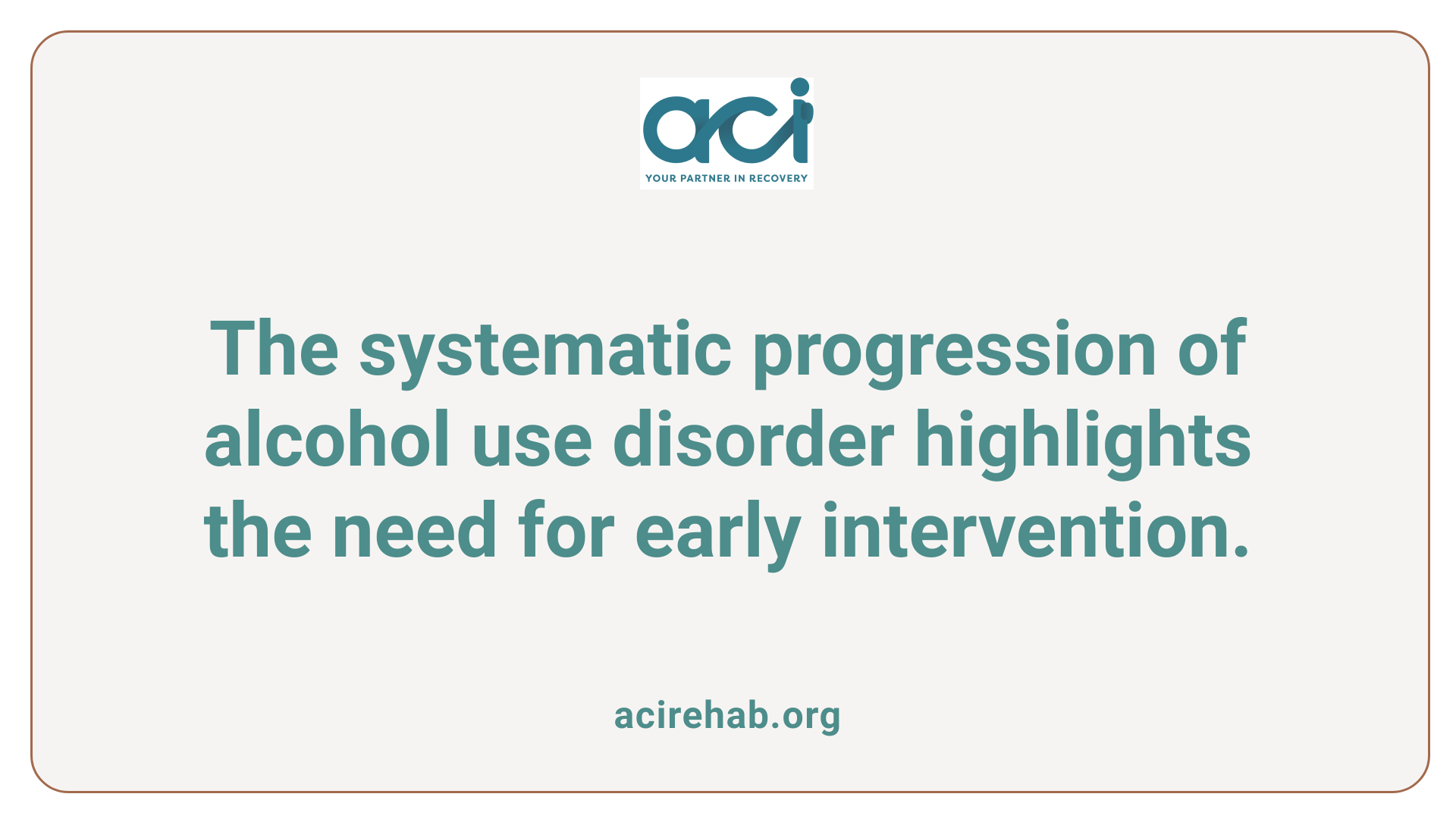
How does alcohol use disorder progress through different stages?
Alcohol use disorder (AUD) follows a systematic progression through distinct stages, each with its own characteristics and consequences.
-
**Stage 1: Pre-Alcoholic
- Characteristics:** Experimentation and binge drinking, where men consume five or more drinks and women four or more within two hours.
- Consequences: Casual drinking may begin to serve as a coping mechanism for stress or anxiety, signaling the potential for future dependency.
-
**Stage 2: Early Alcoholic
- Characteristics:** Increased tolerance and frequency of drinking, leading to psychological dependence. Blackouts and secrecy often accompany drinking habits.
- Consequences: Signs of hidden drinking emerge; individuals may rationalize their behavior despite well-known risks.
-
**Stage 3: Middle Alcoholic
- Characteristics:** This stage is defined by problem drinking, where emotional, social, and financial problems become evident. Attempts to control drinking often fail.
- Consequences: Relationships and work responsibilities suffer, and health issues begin to manifest physically.
-
**Stage 4: Late Alcoholic
- Characteristics:** Marked by physical dependence and severe withdrawal symptoms. This stage shows a total loss of control over drinking habits.
- Consequences: Life revolves around alcohol, leading to critical health deterioration, including liver disease and significant cognitive decline.
-
**Stage 5: Recovery
- Characteristics:** Commitment to sobriety and rehabilitation is emphasized, focusing on overcoming the addiction through treatment.
- Consequences: Individuals work towards maintaining sobriety while addressing underlying issues that could lead to relapse.
In summary, professional medical treatment is vital across all stages of AUD to mitigate escalation and support recovery efforts.
Subliminal to Critical: The Stages of Intoxication
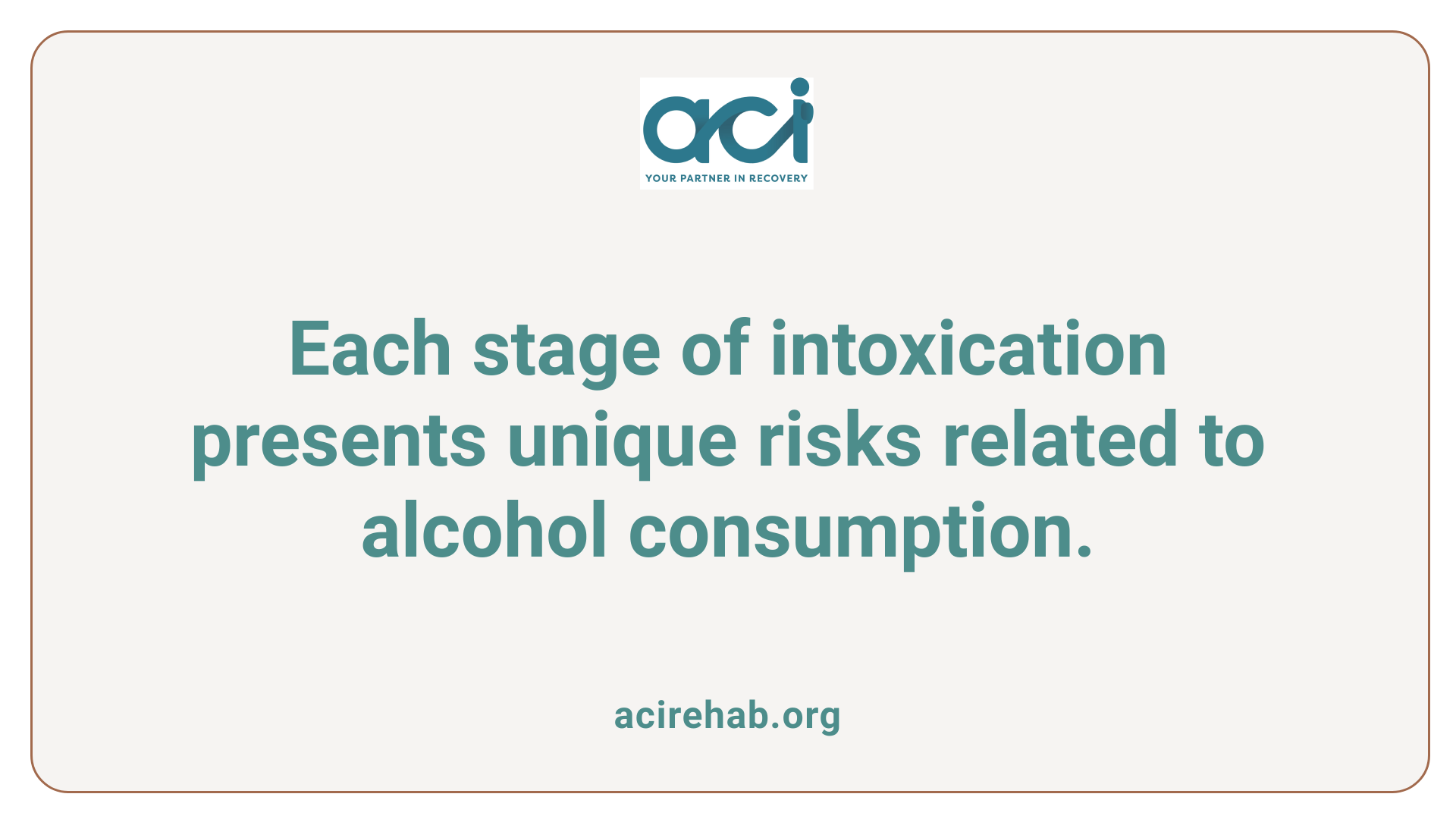
What are the seven stages of drinking related to intoxication?
The seven stages of drinking related to intoxication are categorized by blood alcohol content (BAC) levels, each with distinct effects:
| BAC Level | Stage | Effects |
|---|---|---|
| 0.01-0.05 | Subliminal | Slight changes in behavior, mild reaction time slowdowns. |
| 0.06-0.10 | Euphoria | Increased confidence, lowered inhibitions, and more sociability. |
| 0.11-0.15 | Excitement | Impaired judgment and coordination, higher risk of accidents. |
| 0.16-0.20 | Confusion | Significant cognitive impairment and disorientation. |
| 0.21-0.30 | Stupor | Severe impairment in motor functions and responsiveness. |
| 0.31-0.45 | Coma | Unconsciousness, severely depressed bodily functions, high risk of death. |
| Over 0.45 | Death | Cessation of vital functions, leading to potential fatal outcomes. |
Understanding these stages highlights the serious risks associated with excessive alcohol consumption. Alcohol can impair reasoning, increase the likelihood of accidents, and contribute to long-term health issues. The progression from minor impairment to critical health risks illustrates the need for awareness and responsible drinking practices.
Recognizing the Pre-Alcoholic and Early Alcoholic Stages
Characteristics of Early Stages
The journey into alcohol use disorder often begins subtly. During the Pre-Alcoholic Stage, individuals engage in social or binge drinking, utilizing alcohol as a pathway to relieve stress, anxiety, or boost self-esteem. Despite a lack of significant issues, this stage may lay the groundwork for future dependency.
In the Early Alcoholic Stage, behaviors shift noticeably. Increased frequency of drinking, blackouts, and drinking in secret become apparent. The once benign use of alcohol for mood enhancement starts transitioning into a compulsive ritual, suggesting early signs of addiction.
Behavioral Changes in Initial Phases
As individuals progress, several behavioral changes are often observed:
- Increased Tolerance: A growing need for alcohol to achieve the same effects.
- Secrecy: Drunkenness becomes hidden, with individuals lying to friends and family about their consumption.
- Coping Mechanism: Alcohol is increasingly used to manage stress or emotional distress, rather than for social enjoyment.
Recognizing these early indicators is crucial for timely intervention and recovery.
Middle Alcoholic Stage: Recognizing the Signs and Consequences
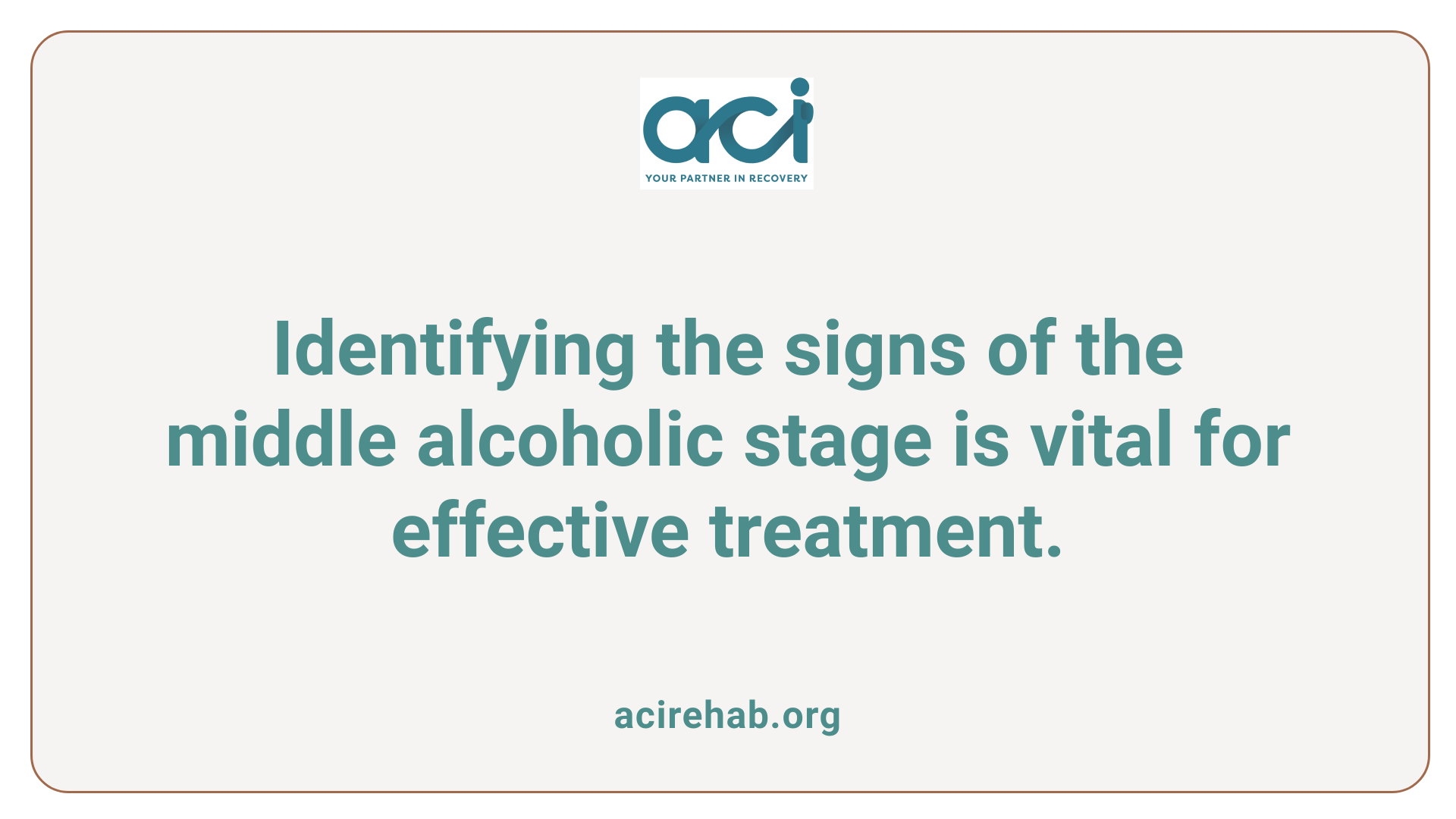
Physical and Psychological Impacts
The middle alcoholic stage, often deemed a serious phase of alcohol use disorder, marks a significant turning point in an individual’s relationship with alcohol. During this stage, consuming alcohol becomes less about social enjoyment and more about fulfilling an increasing compulsion. Physical symptoms may manifest as withdrawal effects like headaches or tremors, highlighting a growing dependency on alcohol. Mental health can also take a toll; prevalent symptoms include heightened anxiety or irritability, particularly when access to alcohol is restricted.
Changes in Personal and Professional Life
In the middle stage, the consequences of alcohol use spill over into everyday life. Individuals often exhibit neglect of responsibilities, missing work or school, and experiencing deteriorating personal relationships. Financial issues frequently arise as alcohol consumption prioritizes spending on drinking over other essential needs. These issues contribute to a downward spiral, where the psychological burden of guilt and shame exacerbates drinking behavior, hence reinforcing the vicious cycle of addiction.
Late Alcoholic Stage: Severe Risks and Health Impacts
Critical health issues
The late alcoholic stage, often referred to as end-stage alcoholism, signifies a time when alcohol consumption has severely compromised an individual’s health. Complications such as liver disease, particularly cirrhosis, become prevalent. Other serious health risks include heart problems, stroke, and various cancers, while individuals face significant neurological damage, including conditions like Wernicke-Korsakoff Syndrome.
The need for intervention
At this stage, drinking becomes a dominating presence in life, often overshadowing health and social relationships. The intensity of withdrawal symptoms upon cessation—such as anxiety, tremors, and nausea—can be dangerously debilitating. Immediate medical intervention is crucial to address these health challenges and to initiate recovery, as the risks of overdose and death substantially increase without professional support.
Recovery: The Path to Sobriety
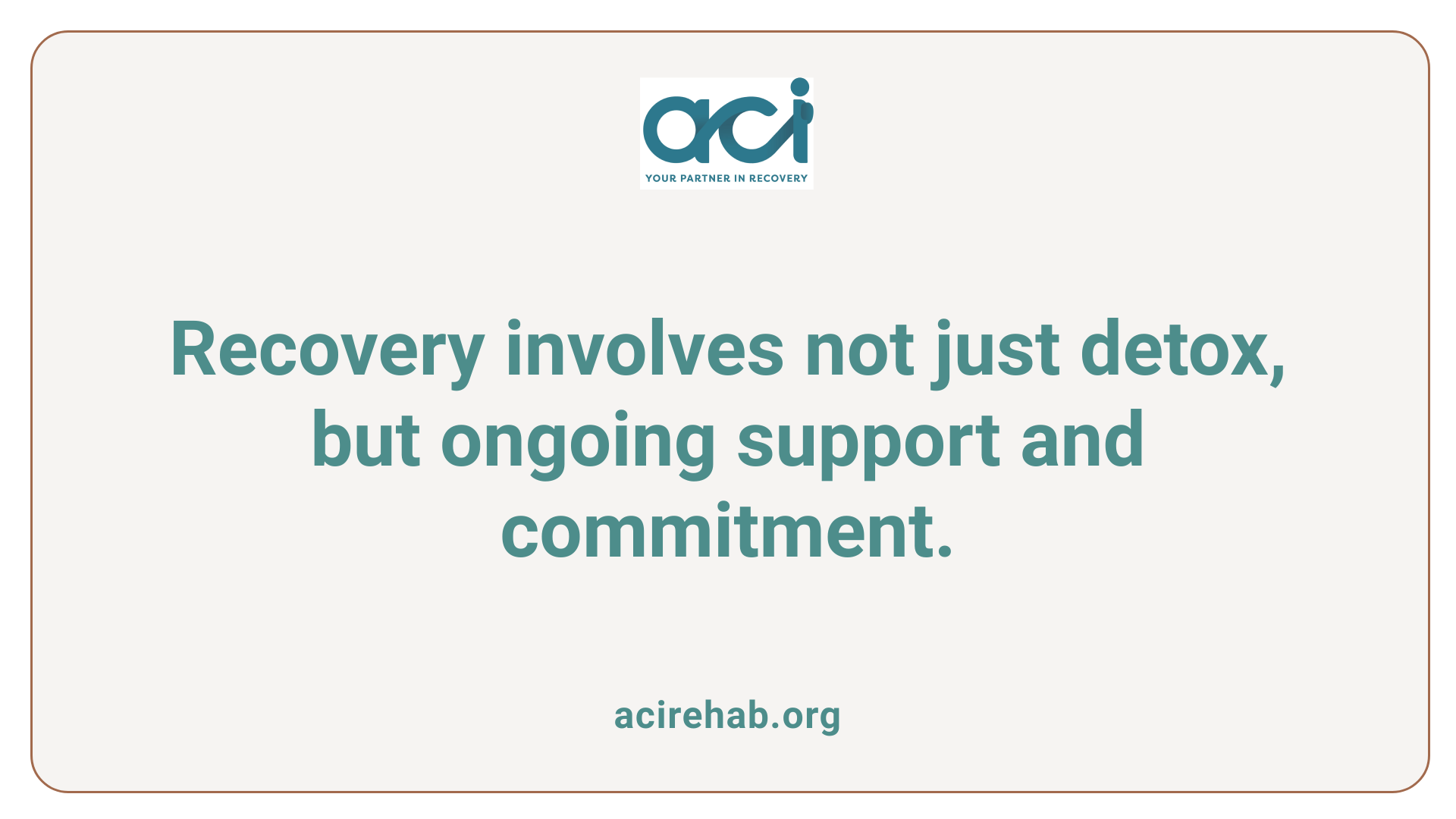
Transitioning from Detox to Treatment
Recovery from alcohol use disorder (AUD) begins with detoxification, a critical first step that removes alcohol from the body safely. During detox, individuals may experience withdrawal symptoms such as anxiety, confusion, or tremors, making medical supervision essential.
Following detox, structured treatment programs help address psychological and behavioral elements of addiction. These treatments can include individual counseling, group therapy, and support groups like Alcoholics Anonymous (AA). This phase emphasizes rebuilding life skills, coping strategies, and understanding triggers to reduce the risk of relapse.
Maintaining Long-Term Sobriety
Sustaining sobriety involves ongoing commitment and support. Individuals in recovery are encouraged to engage in aftercare programs, which may consist of therapy sessions, regular check-ins, and relapse prevention strategies.
Support networks play a vital role. Building relationships with others in recovery can help reinforce positive behaviors, offering both accountability and encouragement. Additionally, adopting a healthy lifestyle, including exercise and nutrition, can bolster emotional well-being and strengthen resolve against relapse.
The Importance of Intervention and Support
Early Detection
Recognizing the early signs of alcohol use disorder is crucial for effective intervention. Common indicators include increased tolerance, frequent changes in mood, or drinking to cope with stress. Early detection can prevent progression to more severe stages, reducing the risk of chronic health issues and other life complications.
Resources and Support Systems
A solid support system is essential for recovery. Various resources are available:
- Hotlines: National and local addiction hotlines offer immediate help and guidance.
- Therapy: Individual or group therapy can provide coping strategies and emotional support.
- Support Groups: Organizations like Alcoholics Anonymous (AA) provide communal support from those with shared experiences.
- Rehabilitation Programs: Medical detox and comprehensive care address both the physical and psychological aspects of addiction.
These resources work synergistically to foster recovery and help individuals maintain sobriety in the long run.
The Road to Recovery
Understanding the stages of alcoholism aids in recognizing the problem early and seeking timely help. With appropriate treatment strategies and support systems, individuals can transition from dependency to recovery, culminating in a healthier, fulfilling life.
References
- Stages of Alcoholism | Signs, Symptoms, Treatment
- Stages of Alcoholism: Early, Chronic, and End Stage
- Stages of alcoholism – Priory Group
- The Cycle of Alcohol Addiction
- The Stages of Alcoholism: Early, Chronic, and End-Stage
- End-Stage Alcoholism: Signs, Symptoms, and Treatment
- The Four Stages of Alcoholism: Pre, Early, Middle, & Late
- The Stages of Alcoholism & Jellinek Curve Explained – WebMD
- 3 Stages of Alcoholism | Alcohol Rehab and Treatment
- Stages of Alcoholism: When Is It A Problem? – Healthline

